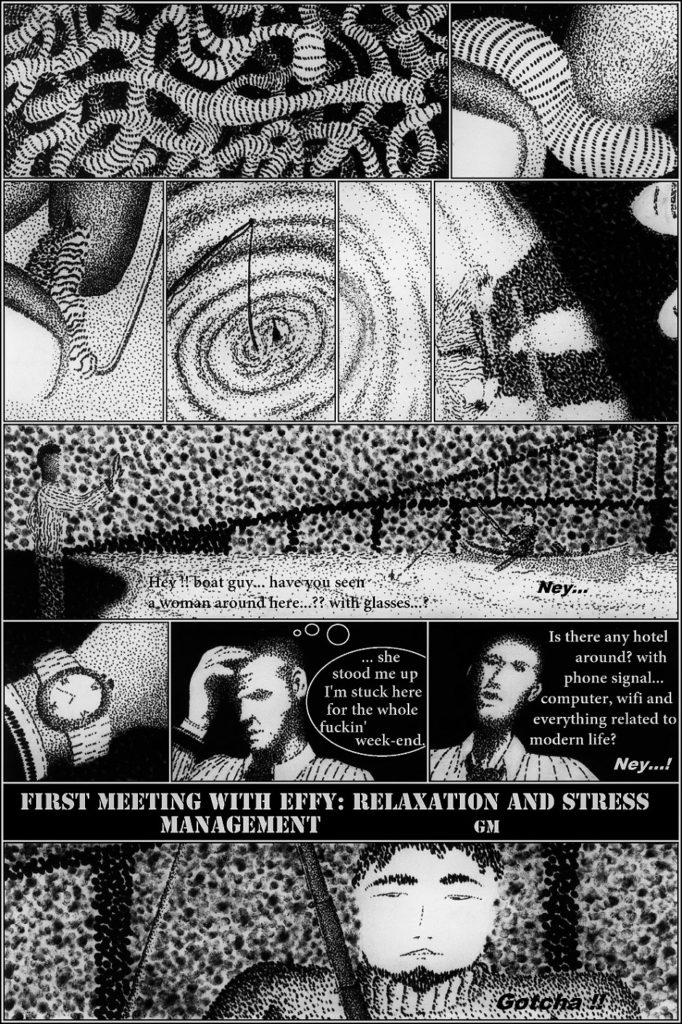Batch nine of Effy – The living efficiency is gorgeous… Quiet pointillism to reflect on stress management; black ink to tattoo the indelible impact of inspiration; vertiginous lines to cage secrecy; and light plays to spot the battle between reason and instinct. Gorgeous.
Don’t miss his weekly updates on Effy’s own page or through Tapas!
Relaxation, stress management and performance
No, Effy (efficiency) has not disappeared, she’s just ethereal, here, around us, within us… and nowhere all the same. At the individual level, efficiency can be synonymous to performance, since both mean optimizing inner resources to achieve greater results. Physical abilities, knowledge, talent, practice all these are basic resources from which we generate performance.
Individual performance
From an HR perspective, selecting, hiring, onboarding and training are all aiming at standardizing the resource an organization is employing. So the expected performance too can be standardized considering resources are set. That’s the logic behind grid objectives and standard appraisal scorecards. In a large organization where resources are heavily standardized, performance is often derived from the resource ability to reach its target without burning out, and that edge is stress management.
I invite you to read this article from Explorable that presents classic correlation models between stress and performance. The main takeaway is that by managing stress, individual can increase their performance above the standard point of fatigue.
Stress management
Now people I work with very often blame objectives, and targets as being a source of bad stress, impacting their efficiency and well being. It’s sometime true. More often though, it’s due to a struggle in managing an important resource at their disposal: Time! Balancing time, allowing idle time, allowing a personal life, all these are not detrimental to performance. On the contrary, idleness help the body to rest, help the mind to regenerate, and help creativity (as we saw in chaos theory, changes of mind provide alternatives and solutions to increase performance). As a manager, I often need to spend time helping staff to balance their time. I found that in the long run, it saved me time on management duties to spend two hours going through what no business schools apparently told them, how to effectively balance their time in a sustainable way.
This helps to create a team which is more focused, more innovative, and less likely to burn out; so greater performance, lower turnover, easier management.
Technology
Technology can be another support. Project management software, advanced communication tools or RPA can help manage and save time. However, the invasive nature of modern technology also means that with a phone and a cloud, you’re virtually able to work 24/7 in some industry, which makes stress management even more crucial to ensure healthy performance sustainable on the long run.
Human resource departments are generally aware of stress management benefits, but often fail to communicate this to other team managers and their direct direction, which are more accustomed to the classic squeezing approach, relying on extended use of OT and target pressure to stimulate short term performance. As a result, we observe some questionable decisions, such as forbidding coffee/cigarette breaks (or making them physically impossible). These informal breaks though, achieved horizontal and vertical idea sharing more than any other company wide suggestion box type of policy…
Relaxation
Time management aside, relaxation greatly contributes to reach a better work-life balance. Far from full yoga session under a desk, there are various techniques that could also be applied for work environment such as the one provide by Learn Relaxation Techniques. As a manager, I generally suggest well spaced holidays and ghost time.
As for Effy, her own technique to fish and nurture over achiever is to impose idle time…
Even though I haven’t seen a WWED tattoo yet, I’ve seen many people using substitute. Very expensive watch being one of them. A simple reminder that “time is money”, one of financial efficiency core guiding principle. An inspiration, to become a role model for efficiency.
Efficiency & Inspiration
In the article for “Firing Effy”, we covered how the race to efficiency is often elevated as a dogma. A principle which is both true and doesn’t need to be debated. Efficiency is inspiring, and very concrete too. It got it all: promise for a better tomorrow (concept of improvement), no resource barrier to entry (everyone, everywhere can claim to be able to become more efficient), a universal purpose (a greater good). As such, it inspires a lot of followers and prophets, more or less zealous, that will use or abuse this dogma in order to reach their goal and prevent any form of contradiction.
Role model
Under such paradigm, idols, icons and role models provide a guiding light… Role model, as per the Merriam-Webster dictionary is: “a person whose behavior in a particular role is imitated by others”. Therefore, it is often use in management and leadership to provide an example, a figure to follow. Stakhanov, Bill Gates, or Lei Feng, all were figures cemented into role models. Models tweaked and heavily promoted, to set clear-cut values and behaviors to imitate, without much questioning. As for efficiency, who better than Effy herself for the role!
WWJD? No WWED…
And in the pure tradition of overzealous pious persons, today’s guest went in to get his WWED tattoo, to remind him the way…
A lot of people stress the importance of information, and the value attached to it. New economic models are often based on leveraging access to big data with AI ability to process it. Both together, it can provide optimized solutions to their clients. That is the model communicated for the world to hear. The one easily available (with internet how-to and all); the one media economists are publicly debating about. But that’s not the one being discussed behind closed door, at least behind the closed door I’ve accessed. The target today as it was before (and new technology hasn’t fundamentally changed that) is to value secrecy!
Secrecy as source of value
Information has value, no doubt about that. However, accessing, collecting and processing a wide range of data is very demanding. That requires a rather large and exposed structure, that is piling up resources (time, material & human) in the process. All this can quickly weight against financial efficiency (you can refer to for the efficiency formula from Humanitis episode), making the whole venture leaping into the future (maybe), but at loss (most of times). Bubble, bubble, bubble… pop!
So information has value, and keeping it concealed makes accessing it even more valuable. So the real discussions nowadays are about privacy of information and data: how to ensure it for ourselves, how to breach others, and how to monetize the result. Legality is often an afterthought. The boundary between insiders’ illegal behaviors and smart companies’ competitive advantage being very very very thin at times.
Back to classics, lost retreats
Old time solutions to secure information are obsolete, providing risks and opportunities. From a legal point, NDA (non-disclosure agreements) or professional covenants (lawyer or doctor) are no longer effective. Insiders, reporters (albeit less and less) or whistle blowers (who sometimes benefit from specific laws on their side) often disregard such legal constraints.
From a tech point of view, cyber security battles pirates, and they will forever. Sometimes guards win, sometime they loose. Banks (HSBC US data breach article on Financial Times), government (a top 10 list from Digital Guardian), or large internet companies (Facebook data breach article from Forbes), all have seen their database breached at some point, and they will be again. And dropping all your electronic devices outside of meeting room is pointless; IoT (internet of thing) progresses have connected the table, chairs, windows, blackboard and pen already, exposing them to interference (even Tesla cars and kids’ dolls were hijacked…).
From a social perspective, information circles can be breached too. To mitigate the risk, interconnected interests solidify mutual trust. That’s partly why the same group of people are sometimes monopolizing top positions, it simply is safer in terms of information sharing. Unfair, unethical, but safer…
Solitude & secluded space
And so today Effy (which we already know does not deal with moral or legal hurdles) found one of the few place she could use to efficiently share valuable information without being disturbed. A yacht in Bora Bora lagoon, or white beach in Mauritius island could have worked too…
Efficiency is a logical concept clouded by reason, that often excludes intuition or instincts. But rather than being in conflict, we should bet on reasonable intuition to optimize efficiency.
Efficiency: A concept clouded by reason
Efficiency is often defined as a logical concept; a concept that can be assessed reasonably (article about efficiency definition here and here). As such, we teach and experience efficiency in logical environments. Courses use .ppt with argumentative points to teach efficiency, not empiric field demonstration in nature. We measure efficiency through mathematical formula with inputs and outputs factored in reasonable units (this is even more so for financial efficiency as we saw in Humanitis). By contrast, someone using emotions and feelings to assess efficiency will not be taken seriously.
This reasonable atmosphere clouds the concept of efficiency, to the extent that analysts and decision makers often overlook unreasonable factors. By this, I mean that they seldom consider aspects not based on reason when assessing efficiency issues.
Instinct and intuition as natural source of efficiency
However, some of the most efficient solution are not reasonable. Example you ask? Human natural ability to secrete sweat to cool of the body, or to lower energy consumption and recharge the body are very efficient, yet they are pure instinct and intuitive.
Instinct is “a largely inheritable and unalterable tendency of an organism to make a complex and specific response to environmental stimuli without involving reason” (definition from Merriam Webster dictionary). So by definition, instincts cut the amount of resources needed to process an issue. Take decision making as a process, instincts accelerate this process in many situations (actions you are doing without even thinking about it, like breathing, digesting, sleeping…), making it a very efficient tool.
Intuition too has similar benefits to accelerate a process, but is based on experience. Keeping with decision making, previous experiences create a set of data that we group into patterns. These recognizable patterns help to create shortcuts, shortcuts used by intuition to accelerate the process. So if you disliked broccoli before, your intuition will tell you not to eat cauliflower.
Betting on reasonable intuition
The drawback of both instincts and intuitions is that they can be wrong. Instincts can be surpassed to achieve greater goal, previous experiences forming your intuition might be flawed (as we saw in ‘Ageing memory sucks‘)… in the end, you might even like cauliflower. From an efficiency standpoint, it becomes a bet: cut resources needed for a process against the odd of ending with a failed result.
Reality probably lies in between, and we can attain efficiency through reasonable intuition. This means using reason to review, assess and integrate intuition or instincts in the quest for efficiency.
In practice?
Practically, it means that I personally use intuition & analytical approaches to spot organizational inefficiencies. As time pass, intuition is becoming more and more important (sorry, I call that ‘experience’ in meeting), but I always keep an analytical audit on the side. The same goes for improvements solution and action plan. I will always use a logical framework, that include room for intuition and instincts. For example, I will always interview processing staff to get their intuitive / instinctive feedback, and based on this brainstorm, we will investigate and reasonably analyse some of the solution. Again, presentation to management or clients often includes ‘experience’…
What’s next?
As of now, the debate remains open. Having intuition as input makes it non-measurable (you can refer to Potentialism for non-measurable issues in measuring efficiency), and so one cannot demonstrate it is indeed more efficient than a purely reasonable approach. And now Effy is having an internal struggle, her reasonable side fighting against her instinctive one…












